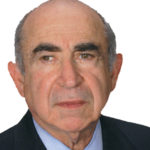With the help of Victor Cohen, this is part of our ongoing series with Eugene Cohen, founder of the Eugene Cohen Insurance Agency, Inc., 2009 Honoree International DI Society W. Harold Petersen Lifetime Achievement Award, 2015 Honoree of NAILBA’s Douglas Mooers Award for Excellence.
From time to time, we will feature an interview with Eugene, who has dedicated over 60 years of his life to learning, teaching, and supporting brokers in the agency’s quest to help consumers protect their income from the tragic effects of a disability.
Disability insurance (DI) is one of those products that can change the trajectory of an individual and a family’s life and is crucial for every financial planner and insurance professional to learn about and offer to clients.
Victor: I know you are very passionate about owners of small and medium-sized businesses needing disability business products. It’s an area of disability insurance that often goes overlooked. Can you tell us more?
Eugene: Yes, business owners definitely have unique DI needs that non-business owners do not have. But like most clients, a business owner needs an individual disability income protection policy.
Let’s suppose a small business owner has an individual disability insurance policy with a $10,000 monthly benefit and a 90-day elimination period. If disabled, they will receive a monthly benefit payment at the end of the fourth month—let’s say until age 65.
But let’s say our client is a disabled small business owner. They have a lease and other business expenses like salaries for their three employees, utilities, phone bills, and other business expenses.
If this small business owner has a qualifying disability, let’s say they will receive a benefit from their individual disability insurance policy to cover their non-cancelable living expenses…but what about those noncancelable business expenses? Remember, disabled or not, the bills to keep the office running are still coming in. Where is the money for that? A small business owner’s business expenses could be $20,000 per month.
This business owner needs a disability business overhead expense (BOE) policy. It helps protect their business by paying many of those qualified business expenses. While the business owner may not be working, the BOE policy will be.
Imagine a business owner who is totally disabled and their doctor says, “You should be able to go back to work in one year.” Without a business overhead expense policy there may not be anything to go back to. The business could be gone.
Victor: How do you suggest the producer help their client who is a small business owner see the need for business overhead expense insurance?
Eugene: Just like with all DI products, the best way for a producer to help a client uncover the need is by asking questions.
Ask the business owner client, “If you were disabled for more than one month and your disability lasted at least a year, would you have a problem keeping your business open and running? Because there is a policy available that will cover many of your qualified business expenses. The benefit period could be 12 monthly payments, 24 monthly payments or 30 monthly payments.” Each company may have their own qualifications and limitations when considering eligible BOE candidates.
Victor: It feels like this is a must-have DI policy for owners of small and medium-sized businesses.
Eugene: The need is there. All the producer needs to do is ask questions. For example, let’s say the producer asks their client if they have a business partner and it turns out they do. Each client owns 50 percent of the business with each sharing 50 percent of the business expenses.
Now the producer can suggest talking to the other partner about picking up a BOE policy too. With each owner responsible for perhaps $10,000 per month in business expenses, if one of the owners is disabled, it does not have to be a tremendous financial burden on the partner still working. The disabled partner’s share of qualified expenses would be paid by the BOE policy.
I believe that need motivates action. When the client understands the need for a particular product, they want to act. In the examples just mentioned, the clients would certainly understand that it would be to their advantage to protect their individual DI policies and not be financially burdened by business expenses if they were disabled for a short time.
The most important thing is that your client is aware of this type of insurance so they can make an intelligent decision if this is something they need.
Victor: How does the BOE policy pay and what is the target market?
Eugene: These types of policies will reimburse the policyowner for the business expenses that qualify per the policy. The premiums are deductible as a necessary business expense. Generally speaking, the target market is clients who are 35 to 55 years old who own small to medium-sized businesses.
Victor: BOE protection really seems to be just the tip of the iceberg when it comes to DI products available to the business owner.
Eugene: Business owners are an exciting market. They have so many needs. For example: The advisor has a meeting with their client, looks over their buy and sell agreement and says to the client, “If one of you were to die, we have to make sure there are dollars to buy out the other partner.” The partners are in agreement. They need that. And they purchase a policy to fund the buy and sell agreement that would pay upon the death of one of the owners.
Now, what happens if instead of passing away, one of the owners has a serious disability? What if they have a serious illness or get in a serious accident that disables them for more than a year?
This is why it is important for the owners to each have a disability buyout (DBO) policy. It provides the funds needed to purchase a totally disabled business owner’s interest in their business.
Victor: Can you give an example of how a DBO policy may pay?
Eugene: The policy helps to provide the funds needed to execute the buyout agreement in case there’s a serious disability. Let’s say you have two owners who are each 50 percent owners of a business worth $2,000,000. If one of the partners had a qualifying disability, per the agreement and the policy, then, after the elimination period, the insurance company would pay the policyowner the funds. This could allow the policyowner to have the funds needed to fulfill the agreement. That’s a simple example of how the policy works. Each company has its own qualifications, minimums and maximum benefit amounts.
How do you uncover the need for DBO? You ask questions. “How are you going to fund your buy and sell agreement for disability if one of you is totally disabled and can’t work in the business anymore? Are you going to use business revenue? Is the remaining partner going to take out a loan? If it’s a corporation, are you going to sell shares of the business for capital?”
Victor: Can you please also talk a little about disability loan protection for the business owner client?
Eugene: If your business owner client has an existing or upcoming business-related loan or loans they are planning to take out, business loan protection can possibly help a business owner continue to pay their business-related loan(s) if they become totally disabled and can’t work.
To uncover the need, ask the owner of a small or medium-size business if they have any outstanding loans related to the business. And if they do, then explore with DI companies if the client has an insurable qualified loan.
Finally, the small or medium-sized business owner may have a key person who is extremely important to the operation. If that key employee were to become disabled, naturally it could cause hardship to a business.
So, the corporation or business may want to own a policy on that key employee. The policy could pay a lump sum or a combination of monthly payments and a lump sum payment if that employee were disabled. The elimination and waiting periods and issue limits may vary.
A key person disability policy can be a very important policy to help a business get through a challenging time when losing a key employee due to a total disability.
Victor: Thank you, Eugene, for talking about disability insurance business products. I know there is so much more you could share. Looking forward to us doing this again soon. Can’t thank you enough.
Eugene: Thank you, Victor. It’s always great talking DI with you!





























